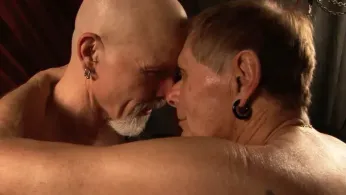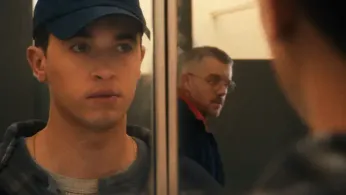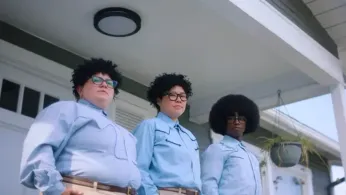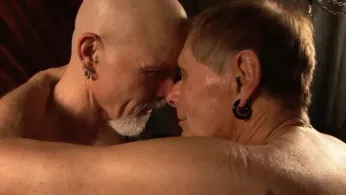
Jun 9
Frameline49 – films in full: SF International LGBTQ Film Festival expands
Brian Bromberger READ TIME: 1 MIN.
At a time when the LGBTQ community is being attacked on the local, state, and federal levels in an attempt to rewrite and censor history as well as eviscerate their lived experiences, the power of film to bolster and protect our queer identity is paramount. This is the underlying sentiment as Frameline49 kicks off June 18-28, screening nearly 150 films from 40 countries.
With the Castro Theatre still unavailable, festival venues include the Roxie Theater, American Conservatory Theatre’s Toni Rembe Theater, Vogue Theater, the Herbst Theatre, KQED, The New Parkway Theater in Oakland, and even Oasis nightclub.
Because of grant cuts by The National Endowment for the Arts and shifting corporate priorities, to make up for some of these revenue losses, Frameline launcher its Queer2Queer Campaign, encouraging supporters to reaffirm their commitment to making films accessible by “adopting” a screening, which will help cover the cost of a screening.
Frameline is also starting its Pay-It-Forward initiative, asking patrons to cover the cost of their tickets to the First Friday screening of the trans documentary “Heightened Security” (June 20).
As Frameline’s new Director of Partnerships & Development, Matthew Ramsey, adds, “Let’s show the world the unwavering strength and solidarity of the queer community.”
Allegra Madsen, Frameline’s Executive Director, recognizes the urgency of the political/cultural crisis we’re now enduring.
“All of us are weathering challenges that threaten our identities, our histories, and our everyday lives,” she said in a press statement. “Like many of you, I’m exhausted and angry. With Frameline49, I want us to examine our past of LGBTQ activism and art. I want to honor the powerful stories of this moment, to remind us all that Frameline is both a celebration and a statement. We’ll still engage in difficult conversations and recognize the realities reflected in our films, but we’ll also create spaces where we can untense our shoulders and laugh together, without having to defend our existence. Resilience to the hard times can coexist with having a really good time together.”

A tense psychological thriller, “Plainclothes,” is a festival zenith. Set in 1997 in upstate Syracuse, New York, Lucas (Tom Blyth) is a young closeted gay cop assigned to a special task force on undercover “plainclothes” duty at the bathroom of the local mall, a well-known gay hook-up site. The police cruise and entrap the gay men, getting them to expose themselves and then arrest them for lewd conduct.
He falls for one of his marks, Andrew (Russell Tovey) whom he lets go free. Andrew is also closeted, married with children and there’s a shocker when Lucas discovers what he does for a living. They meet in theaters and greenhouses for sex, despite Andrew having a strict rule about not engaging with a guy more than once.
Lucas is falling in love with Andrew, but can’t tell his mother with whom he lives or his family, but is close to his accepting ex-fiancée Emily (Amy Forsyth). Blyth is a charismatic revelation and on his way to major stardom, while the wonderful gay English actor Tovey plays against type to perfection. Their chemistry is palpable and electric. Opening in theaters in September, not only a peak moment at Frameline49, but one of the best LGBTQ films of the year.
To celebrate Juneteenth, Daniel Junge and Sam Pollard’s documentary “I Was Born this Way” about Archbishop Carl Bean will be shown. Bean sang the 1977 Motown hit “I Was Born This Way” which was the world’s first gay disco anthem. The song and Bean’s story inspired Lady Gaga’s modern LGBTQ anthem “Born This Way” (2011).
Born in Baltimore in 1944, Bean was the victim of sexual molestation, and at age 15, after a romantic relationship with a neighbor boy was discovered by his adoptive father, Bean attempted suicide. Recovering, he fled to New York City and joined the renowned choir at Christian Tabernacle in Harlem.
He began singing professionally, forming his own group, Universal Love. He refused Motown’s offer of a new album of traditional heterosexual love songs, deciding his role “was to be a change agent in society.”
In 1985, he formed the Minority AIDS Project, the first HIV organization dedicated to PCAs. Ordained in 1982, the following year, he began Unity Fellowship Church, the first Christian church for Black LGBTQ people.
Using innovative rotoscope animation and featuring appearances by Lady Gaga, Quest-love, Billy Porter and Dionne Warwick, the film is primarily an interview with the unapologetic, fearless, compassionate Bean before he died in 2021, with lots of archival footage. The film celebrates his trailblazing legacy and his resounding message God’s love is for everyone.
The uplifting Irish comedy “Four Mothers” is a lovely surprise in what could have been a cartoonish, mawkish, clumsy mess. YA novelist Edward (James McArdle) is taking 24/7 care of his mother Alma (Fionnula Flanagan) following a stroke, which left her unable to speak, but not her ability to be opinionated. He’s on the cusp of incipient literary success with his queer novel about a teenager coming out, preparing for a book tour to America.
He’s also dealing with heartbreaking feelings about his recently ended relationship with his ex-boyfriend, as well as unresolved anger about his late father. His three gay male friends dump their elderly mothers on him, because they want to escape for a dissolute Maspalomas Pride weekend abroad. Edward must deal with their meal requests and constant bickering.
The film is loosely based on the 2008 hit Italian comedy “Mid-August Lunch.” As brilliant as Flanagan is, it’s McArdle’s triumph. He’s Scottish but commands a believable Irish brogue. The catty dialogue as well as the acerbic tone, not to mention avoiding the usual clichés of old ladies by making them real, makes this a well-deserving crowd-pleaser. Getting old might actually be fun.
“Ninxs” chronicles 15-year-old Karla and her coming of age as a transgender person. Trans director Kani Lapuerta begins the documentary with both of them sitting in a pink, almost cloud-like cave, a kind of fantasy land with Lapuerta asking Karla does she want to start the film from the past and work up to today or vice versa. Karla picks the former. So this film is a true collaboration that began when Karla was 8, as her spontaneity and honesty intrigued the director.
He follows her from late childhood into her teenage period. Karla is given the space to tell her own story. We see Karla having fun with her best friend, putting on make-up, dressing up for parties, and making TikTok videos.
The climax is whether Karla will be able to change her name and gender on official governmental documents. Her hippish, countercultural parents are totally supportive. Ninxs is a gender-free spelling of children in Spanish. The underlying message is that transgender people have a right to imagine their own lives, to decide what they want, that they have a future. Fortunately, the film doesn’t focus on the hate transgender people face or fears of being killed but on growth, a supportive community, and the love Karla receives from her parents and friends.
When her friend asks Karla what will be the reaction of audiences when they see the film, she replies, “I hope they laugh, that this isn’t a tragic film like most of the ones we [transgenders] appear in.” Mission accomplished as you will grow to love Karla almost as much as the director does. You will feel much more positive about the fate of trans kids after watching this upbeat, heartfelt film.

Pat, “Saturday Night Live”’s famous, evasive androgynous character, a mainstay of 1990s pop culture, is reimagined by trans and nonbinary folk today in the captivating documentary, “We Are Pat.” Pat was created by Julia Sweeney in the late 1980s when she was a member of The Groundlings improv troupe in LA.
Pat was so popular, the character even got their own film, “It’s Pat,” in 1994. Sweeney was trying to make it as a woman comic in the almost all boys SNL club. “I just wanted something that was funny,” she says. “It was a joy to be Pat because I got to have a break from having to be a girl too.”
Filmmaker Ro Haber had a strong obsession with Pat, whom they admired because Pat made others uncomfortable by not adhering to strict gender categories. The film isn’t sure whether Pat is a nonbinary icon or an outdated trans trope. The film shows queer and trans comedians and writers (especially Molly Kearney of SNL now) trying to reframe Pat for new sketches, not to erase but reframe the character in a way that is empowering, not ridiculing.
Sweeney and her SNL co-star Kevin Nealon also appear. The film isn’t interested in canceling Pat but dialoguing, yet never denying the complicated feelings Pat engenders. It’s an ingenious nonconfrontational approach to track the evolution of gender identity and comedy from the 1990s to today’s issues on trans visibility. Don’t miss this sparkling gem.
Another winning documentary, “Heightened Scrutiny,” follows ACLU attorney Chase Strangio, the first trans person to argue before the Supreme Court, as he fights a life and death legal battle to overturn Tennessee’s ban on gender-affirming care (puberty blockers and hormone therapy) for transgender care in U.S. vs. Skrmetti.
The film exposes the link between the biased anti-trans tenor of mainstream media in fueling anti-trans legislation, revealing how it drives hate, endangers lives, and threatens democracy. Insights from journalists (i.e. Jelani Cobb) and activists (Laverne Cox) shape the larger conversation around trans rights and bodily autonomy.
Strangio is engaging and dedicated, even as he must handle the accompanying stress when so much is at stake in battling for the right to access life-saving healthcare. A triumph in advocacy filmmaking in pushing back against the eradication of trans existence, proclaiming a courageous spirit of defiance, regardless of how the Supreme Court rules on this case at the end of this month.
Identity, belonging, and forgiveness anchor the stirring documentary, “Between Goodbyes.” During the 1980s, South Korea was under the rule of a military dictatorship, which enforced a strict one-child policy. Because of that policy and financial struggles, birth mother Okygun had to give up her daughter Miok.
Renamed, Mieke was raised in the Netherlands by a Dutch single adoptive mother, raised in a foreign culture. Mieke found community in an evangelical church, discovered she was queer and met a wife. Okygun and family deeply regretted their decision, so at Christmas they sent a card to say hello, which begins a ten-year reunion process.
The film charts Mieke’s trip to South Korea to celebrate her marriage as well as reconnecting with her birth family, with its accompanying heartache, guilt, regret while navigating a cultural divide. The film is superb in giving voice to the birth family’s emotions while fairly representing Mieke’s ambivalence.
Although same-sex relationships are still dicey in Korea, Mieke’s birth parents welcomes her partner. They even point out to Mieke that had she grown up in Korea, she might not have had the freedom to make this choice.
There’s a touching scene when the family gathers for a symbolic marriage ceremony. Have the Kleenex nearby. The family shows the honest joys and trials of reconnecting with family and the importance of listening to each other in order to develop a stronger bond. It’s unexpectedly poignant as we view their often fraught, but ultimately rewarding ongoing healing process.
If you’ve ever wondered what happened to all the 1960s hippies and countercultural activists, they’ve apparently all settled in Boulder Creek, California alongside the redwood forests, or that’s the impression viewers will have after watching the new documentary, “Playing with Fire: An Ecosexual Emergency,” made by filmmaker, performance artist, former sex worker and feminist pornographer Annie Sprinkle and Beth Stephens, her partner of 23 years.
Lightning ignites the 2020 CZU devastating fires in Northern California, forcing Sprinkle and Stephens to evacuate their home with the film documenting their joyous adventures despite their grief and losses.
It’s a “lush and fiery journey of transformation,” featuring Lady Monster’s fire tassel-twirling burlesque, a dangerous full-body stunt by artist Cassils, a volcanic fire-play massage with sex educator Barbara Carrellas, and an impassioned ritual by performance poet Guillermo Gomez-Pena. Oh yes; and it’s narrated by Albert, Boulder Creek’s mythical pet white peacock.
Other scenes include cremating Annie’s mother’s body, an ecosex (imaging the Earth as a lover) scene in a burnt forest, and a ceremonial Wedding to Fire by the river. It’s an urgent call-to-action as the climate crisis worsens and a portrait of queer resilience, as it honors the power of fire to destroy and renew. Clearly not for all tastes, but it has a kooky charm. It will appeal to climate activists and pagans.

Not for the squeamish, “A Body to Live In,” is a no-holds-barred documentary portrait of controversial performance artist and photographer Fakir Musafar (1930-2018), who used painful BDSM modification practices to access new spiritual planes. He became an icon of the ‘modern primitives’ cultural movement.
The film is anchored by a multi-day-long audio interview he delivered from his death bed in 2018 with fellow leatherman Patrick Mulcahey, along with never-before-seen personal archive of 100+ hours of home videos, films, TV appearances, and lots of photographs
.
The film traces the body mortification movement as it emerged in LGBTQ subculture in the early 1970s with early collaborative experimentation at gay underground BDSM parties, resulting in body-based performance art, and the rise of an entire subculture. It briefly touches on the ethical questions raised by the phenomenon of self-inflicted pain.
Fakir at 17 fasted for two days, restricted his waist with a chain, then clipped his body with hundreds of clothespins, which he claimed gave him feelings of belonging and power. He starred in “freak-show” performances, such as lying on beds of nails as weights were placed on top of him. His wife said, “he was always between genders, but he called it being in the cracks.”
The imagery is extreme, but you can’t help but be fascinated at what Fakir did to his body even if at another level it repels one. If ever a film was a conversation starter, this is it. BDSM folk will be in seventh heaven.
Warning: you will be furious after watching the horrifying documentary, “The Librarians.” The film begins in 2021 when Texas House Representative Matt Krause, also a candidate for Texas State Attorney General, issued a list of 850 books for schools to review for obscene and race-related content, urging officials to develop standards to ensure “pornography” and anything that may make students feel “discomfort, guilt, or anguish” be removed.
The majority of content flagged had racial or queer themes. We meet librarians in Texas, Florida, Lousiana, and yes suburban blue state New Jersey, who are resisting these censorship efforts, thus becoming targets of culture warriors. Often in small towns, queer books are the only sources of information that can help prevent teens from committing suicide.
We encounter Moms for Liberty, who police books available in public schools, looking for titles that are “overtly sexual” and “inappropriate” for children. They bombard school board meetings with intimidation, expletive-laden shouting and not-at-all veiled threats of violence.
We meet a US Army veteran librarian fired for refusing to remove books with racial content. County Commissioners in the wake of a lawsuit to counter the ban, attempt to close the public library itself. In some states there is legislation to criminalize librarians for distributing pornographic materials to minors.
Librarians are heroes in Trumpian America and this era of book banning, unlikely defenders of democracy, risking everything to uphold our most fundamental of rights, freedom of speech and to read what we want. This gripping film, sometimes lapsing into a PSA, is essential viewing.
The National Geographic documentary “Sally” is one of the festival’s winners, detailing the life of an American hero Sally Ride, the first woman astronaut in space, who flew in the Challenger space shuttle in 1983. The core of the film is an interview with her life partner of 27 years, Tam O’Shaughnessy.
Ride wasn’t out publicly in her lifetime. She met Tam as an adolescent at a tennis camp run by Billie Jean King. After King was outed and sued by a female ex-lover, consequently losing endorsements, the negative publicity scared Ride from emerging from the closet (much to Tam’s consternation), despite her sister Bear being a lesbian. Incredibly ambitious and competitive, she could be prickly, all business, and hard to read, attributed to her emotionally closed-off mother.
Ride even married fellow astronaut Steven Hawley, who was unaware she was lesbian until she asked for a divorce. NASA was sexist, with other astronauts decrying she hadn’t paid her dues. The press was awful to her, asking prying questions about her private life, family, and makeup. After the 1986 Challenger explosion, she served on the commission investigating the disaster, but distraught over NASA’s lies about safety concerns, she resigned.
The film adroitly shows how Ride’s personal and professional lives were intertwined, though cheesy, non-dialogue reenactments are unnecessary and distracting. Still, Ride was a trailblazer for women and finally is getting her due, 13 years after dying of pancreatic cancer at age 61.
Look for more film reviews in the next two issues.

